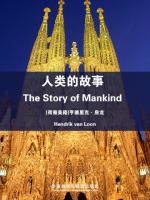Style & Perspective
"The Story of Mankind" by Hendrik Willem Van Loon is a tale of mankind's development from the nothingness of the origins of the planet through modern day science and technology. Written early in the 20th century, the information in the novel is clearly dated, but still manages to provide a base for young readers as to the origins of man. Engaging and entertaining, this book is a must read for any audience.
"The Story of
Mankind," a hopelessly out-of-date scientific account of the
rise of mankind, is an ambitious attempt by Hendrik Willem Van
Loon to explain to a young audience how mankind came to be.
Beginning with the creation of the world and traveling through the
late 1920's, the scope of the work is breathtaking, if not still
accurate. This version also includes several updates that bring
the story to more modern times, but without altering the
historical writings. While the work is quite clearly out of date,
it is an entertaining read, and shows how much mankind has grown
in his knowledge of our origins even in the previous century
alone. The book is easy to read, light, and offers, at the very
least, a humorous look at the world as one viewed it in 1920.
The novel begins with a joyful account of the author's own journey to find enlightenment, which gives a sense as to why the book was written. The author then travels from the origin of the plant through prehistoric man. From Egypt to the Middle Ages, the author then tells briefly of various cultures that helped to increase scientific knowledge over time, including the origins of the alphabet, farming, writing, government, theater, and everything in between. He discusses major battles that changed the course of history, as well as focusing on Greek and Roman civilizations. Also covered are origins of various religious sects, revolutions, the evolution of Europe, and World War I. Finally, in the last section, John Merriman, a professor of history, has written an update to the book. This update covers the years since Van Loon's time through current times, and includes such topics as the exploration of space, the Cold War, medical and scientific advancement, and the role of developing countries. Cleverly written and witty enough to engage the reader throughout, "The Story of Mankind" is one for all levels of readers to enjoy.
This book is written mostly in the third person, with occasional breaks in the first person as the authors speak their own opinions. This third person viewpoint allows the illusion that the author is giving simple facts of world history, and helps to keep the storyline flowing. However, as the author himself admits, any person telling of world history in a small space has to exhibit some form of bias and prejudice even to fit the information in. The author chooses specific instances in history to discuss that he feels are vital to the story of the world. Others, however, may not agree with those choices as definitive moments in history, since such a perspective is extremely relative. In addition, the author shows an extreme bias against most religious movements in history, which lead to a slightly skewed notion of historical events.



 京公网安备 11010802032529号
京公网安备 11010802032529号